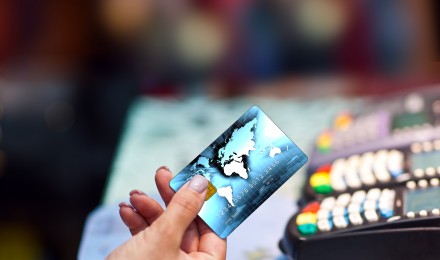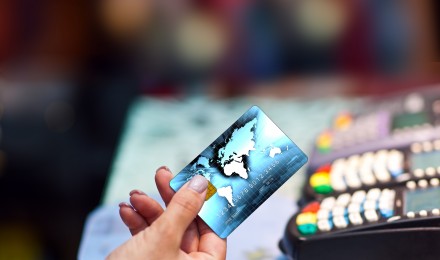Tax season can invoke a host of different emotions. On one hand, you have those who anticipate a refund and they can’t wait to file their returns. But on the other hand, you have those who owe the IRS and they typically wait until the last minute to file their returns.
You can’t get out of paying the IRS monies due; and the sooner you pay your tax debt, the better. The IRS wants its money, but at the same time, the agency realizes that it’s challenging for some taxpayers to strike a check for a large amount. You can take advantage of payment plans through the agency and pay your bill over several months. But if you’re looking to get rid of your tax bill as soon as possible, you can pay your IRS debt with a credit card.
Understand, however, paying your taxes by credit card doesn’t always make sense. It’s convenient and fast, but it can also cost you more in the long run.
When Paying With a Credit Card Makes Sense….
- April 15th is the typical deadline for tax bills and paying your tax bill after this date results in interest charges. If you don’t have the full balance by the middle of April and need a few additional weeks to drum up the cash, it makes sense to use your credit card. You can satisfy your tax bill by its due date and then pay yourself back once you have the cash.
- If you’re like the majority of cardholders, you likely have at least one rewards credit card. These cards let you earn points on purchases and you can redeem these points for airline tickets, cash and other rewards. However, acquiring enough points to redeem a reward requires frequent credit card use, and if you rarely pull out your credit card, it can take years to redeem a reward. Paying a large IRS bill with a credit card helps you earn points faster, in which you can receive a reward quicker.
- Many taxpayers wait until the last minute to send their income tax payment. If you write a check for this payment and wait until April to mail the payment, it can take a few weeks for the IRS to cash your check. Pay with your credit card and you don’t have to wait for the check to clear your account.
When Paying With a Credit Card Doesn’t Make Sense….
- If you don’t have the money to pay your tax debt — and you’re not likely to have the money in the near future — it doesn’t make sense to pay your IRS debt with a credit card. This results in a higher credit card balance, and since balances factor into credit scores, this higher balance can drop your personal score. Set up a payment plan with the IRS and spread out your payment. Plus, the interest charged by the IRS is often less than the interest charged by most credit card companies.
- The IRS’s e-pay service lets you pay taxes by credit card online. This isn’t a free service and convenience fees range from 1.89% to 3.95% of your outstanding balance. If you’re paying your tax bill online with the sole intent of accumulating additional credit card points or a Cashback bonus, do the math first and determine whether the fee outweighs the anticipated bonus.
Tax season can invoke a host of different emotions. On one hand, you have those who anticipate a refund and they can’t wait to file their returns. But on the other hand, you have those who owe the IRS and they typically wait until the last minute to file their returns.
You can’t get out of paying the IRS monies due; and the sooner you pay your tax debt, the better. The IRS wants its money, but at the same time, the agency realizes that it’s challenging for some taxpayers to strike a check for a large amount. You can take advantage of payment plans through the agency and pay your bill over several months. But if you’re looking to get rid of your tax bill as soon as possible, you can pay your IRS debt with a credit card.
Understand, however, paying your taxes by credit card doesn’t always make sense. It’s convenient and fast, but it can also cost you more in the long run.
When Paying With a Credit Card Makes Sense….
- April 15th is the typical deadline for tax bills and paying your tax bill after this date results in interest charges. If you don’t have the full balance by the middle of April and need a few additional weeks to drum up the cash, it makes sense to use your credit card. You can satisfy your tax bill by its due date and then pay yourself back once you have the cash.
- If you’re like the majority of cardholders, you likely have at least one rewards credit card. These cards let you earn points on purchases and you can redeem these points for airline tickets, cash and other rewards. However, acquiring enough points to redeem a reward requires frequent credit card use, and if you rarely pull out your credit card, it can take years to redeem a reward. Paying a large IRS bill with a credit card helps you earn points faster, in which you can receive a reward quicker.
- Many taxpayers wait until the last minute to send their income tax payment. If you write a check for this payment and wait until April to mail the payment, it can take a few weeks for the IRS to cash your check. Pay with your credit card and you don’t have to wait for the check to clear your account.
When Paying With a Credit Card Doesn’t Make Sense….
- If you don’t have the money to pay your tax debt — and you’re not likely to have the money in the near future — it doesn’t make sense to pay your IRS debt with a credit card. This results in a higher credit card balance, and since balances factor into credit scores, this higher balance can drop your personal score. Set up a payment plan with the IRS and spread out your payment. Plus, the interest charged by the IRS is often less than the interest charged by most credit card companies.
- The IRS’s e-pay service lets you pay taxes by credit card online. This isn’t a free service and convenience fees range from 1.89% to 3.95% of your outstanding balance. If you’re paying your tax bill online with the sole intent of accumulating additional credit card points or a Cashback bonus, do the math first and determine whether the fee outweighs the anticipated bonus.







